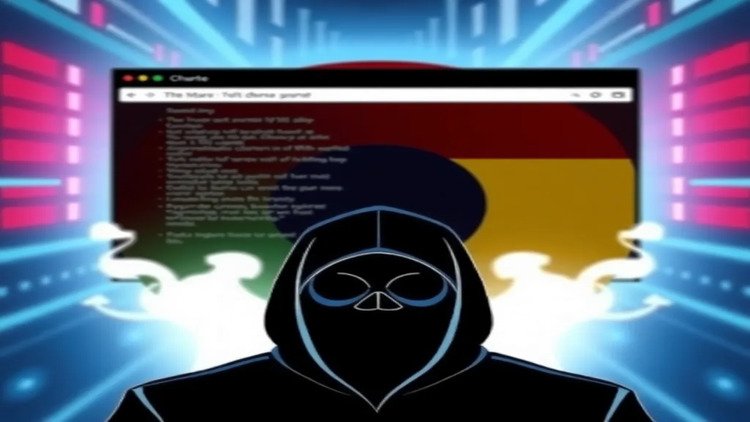Lazarus Group exploited Chrome vulnerability with fake NFT game
In a striking demonstration of cybercriminal ingenuity, the Lazarus Group, a notorious North Korean hacking collective, has exploited a zero-day vulnerability in Google Chrome to launch a deceptive NFT-based game.

The Lazarus Group, a North Korean hacking organization, has recently taken advantage of a zero-day vulnerability in Google Chrome by creating a deceptive NFT-based game. This fraudulent game was designed to target cryptocurrency investors, allowing the group to steal digital assets. The exploitation of this security flaw, tracked as CVE - Overview of the Attack
The Lazarus Group has exploited a critical zero-day vulnerability in Google Chrome, specifically identified as CVE-2024-4947. This vulnerability was leveraged through a counterfeit decentralized finance (DeFi) game that mimicked a legitimate NFT-based platform.
-
Target Audience
The primary targets of this campaign are cryptocurrency investors worldwide. By presenting a seemingly authentic gaming experience, the group aimed to lure users into providing sensitive information or directly transferring their digital assets. -
Detection and Response
The malicious activity was uncovered by Kaspersky Total Security, which identified the presence of Manuscrypt malware on a personal computer in Russia. This detection led to the realization of the ongoing exploitation of the Chrome vulnerability. -
Security Implications
Google has since issued updates to address this vulnerability, emphasizing the importance of keeping software up to date. Users are urged to update their Chrome browsers to protect against such sophisticated attacks. -
Conclusion
The Lazarus Group's tactics highlight the evolving nature of cyber threats, particularly in the realm of cryptocurrency. Investors must remain vigilant and informed about potential risks associated with online platforms and digital assets. The Lazarus Group, a notorious North Korean hacking collective, has recently exploited a zero-day vulnerability in Google Chrome by launching a fraudulent NFT-based game. This deceptive game was specifically crafted to target cryptocurrency investors, enabling the group to pilfer digital assets. The security flaw, identified as CVE-2024-4947, was manipulated through a fake decentralized finance (DeFi) game that closely resembled a legitimate NFT platform. -
Target Audience
The campaign primarily aimed at cryptocurrency investors globally. By offering a seemingly genuine gaming experience, the group sought to entice users into divulging sensitive information or directly transferring their digital assets. -
Detection and Response
Kaspersky Total Security uncovered the malicious activity, detecting Manuscrypt malware on a personal computer in Russia. This discovery led to the awareness of the ongoing exploitation of the Chrome vulnerability. -
Security Implications
In response, Google has released updates to rectify this vulnerability, underscoring the necessity of maintaining up-to-date software. Users are strongly encouraged to update their Chrome browsers to safeguard against such advanced attacks. -
Conclusion
The tactics employed by the Lazarus Group underscore the evolving landscape of cyber threats, particularly within the cryptocurrency sector. Investors must stay alert and informed about the potential risks associated with online platforms and digital assets.
FAQ:
Q1: Who is the Lazarus Group?
A1: The Lazarus Group is a North Korean hacking organization known for its sophisticated cyberattacks, including financial theft, espionage, and the development of malware. They have been linked to various high-profile cyber incidents globally.
Q2: What is the recent incident involving the Lazarus Group?
A2: The Lazarus Group recently exploited a zero-day vulnerability in Google Chrome, identified as CVE-2024-4947, by creating a fake NFT-based game. This fraudulent game was designed to deceive cryptocurrency investors and steal their digital assets.
Q3: What is a zero-day vulnerability?
A3: A zero-day vulnerability is a security flaw in software that is unknown to the vendor and has not yet been patched. Attackers can exploit these vulnerabilities before the software developers release a fix, making them particularly dangerous.
Q4: How does the fake NFT game work?
A4: The fake NFT game mimics legitimate decentralized finance (DeFi) platforms, enticing users to participate. Once users engage with the game, they may be tricked into providing sensitive information or transferring their digital assets to the attackers.
Q5: How was the attack detected?
A5: The attack was uncovered by Kaspersky Total Security, which detected Manuscrypt malware on a personal computer in Russia. This detection led to the identification of the ongoing exploitation of the Chrome vulnerability.
Q6: What should users do to protect themselves?
A6: Users should update their Google Chrome browsers immediately to the latest version to patch the vulnerability. Additionally, they should exercise caution when engaging with online games or platforms, especially those related to cryptocurrency and NFTs.
Q7: What are the implications of this attack for cryptocurrency investors?
A7: This attack highlights the increasing sophistication of cyber threats in the cryptocurrency space. Investors should remain vigilant, conduct thorough research before engaging with new platforms, and implement strong security practices to protect their digital assets.
Q8: Where can I find more information about cybersecurity and protecting my digital assets?
A8: You can find more information on cybersecurity best practices from reputable sources such as cybersecurity firms, government agencies, and educational institutions. Additionally, following updates from platforms like Google and Kaspersky can provide insights into emerging threats and security measures.
What's Your Reaction?















